By Richard B. Muhammad and Tariqah Shakir-Muhammad -Final Call Staffers- | Last updated: May 30, 2017 - 12:55:50 PM

(L-R) Allah’s Apprentice, Akilah Nehandra,Ques. Photos: Haroon Rajaee
|
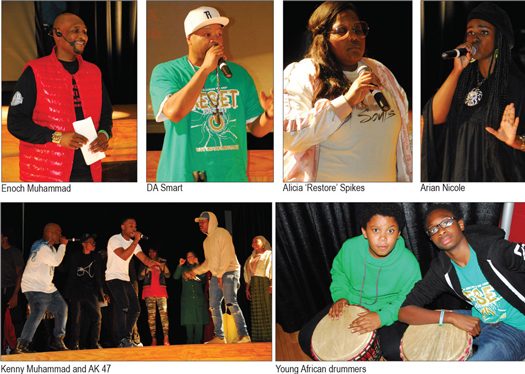 |
CHICAGO—Trap music, drill music, gangsta rap and lyrical expressions laced with odes to drugs, crime, violence and even rape have worried much of Black America as the corporate music complex pushed that product like a narcotic rocking people to a slow death.
But where there is darkness, even entertainment industry induced and encouraged darkness, there is also light. Black America may be on the cusp of a new day and the emergence of a budding and potentially new Black Arts Movement. As Black consciousness rose in the 1960s and 1970s, the cultural expressions and the musical selections fed the thirst for freedom, justice and equality, Black pride and Black power.
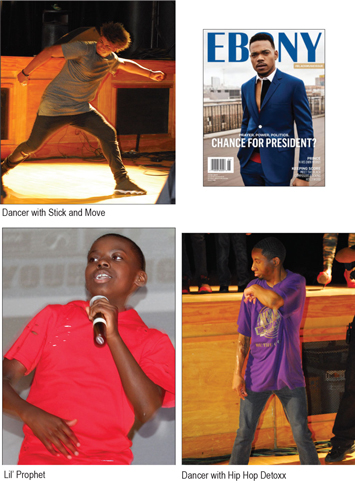 |
Signs in popular music and culture can be seen with the critical success of Chance the Rapper, whose popularity led Ebony magazine to put him on its May cover and ask: “Chance for President?”
The Chicago native declined the push for POTUS: “I would never run for any office or government position.”
“I’m not into it. I think politics is a reason why a lot of stuff doesn’t get done. There’s a lot of favors, and a lot of people are held back by their intentions of being re-elected or the things that they owe their party or constituents. I think when you’re in my position as an artist, I can say what I want and talk about the issues that matter,” he told Ebony.
“Judging by Chance the Rapper’s exponential success, anyone can see that discernment is his best kept secret. Achieve global fame and celebrity success? Check. Win three Grammys as an independent artist with absolutely no help whatsoever from record labels? Double check. Raise $2 million—excuse me, $2.2 million—for Chicago Public Schools after a very disappointing meeting with Illinois Gov. Bruce Rauner? Double check. Well … you get the point,” said Ebony.
Chance challenged the Illinois governor to put money for music and art into Chicago Public Schools and the two met. After the meeting, Chance was unimpressed and put his own money up to help fund such programs—and there was no glad handing with the unresponsive Republican billionaire who leads the state.
Then May 23 Chance scored another hit with city public school students already struck by his donations and open mic nights—he offered a chance for youth to help create a concept for the video to accompany the song “LSD” he made with singer Jamila Woods. In a tweet, Chance made the offer and promised the winner would “shadow the directors and production crew on the set for the day.” Others, he said, could win a chance to shadow the film department on set. The deadline for submissions was set for June 2.

Actors in barber shop skit. (R) Crowd enjoys performance at Muhammad University in Chicago. Photos: Haroon Rajaee
|
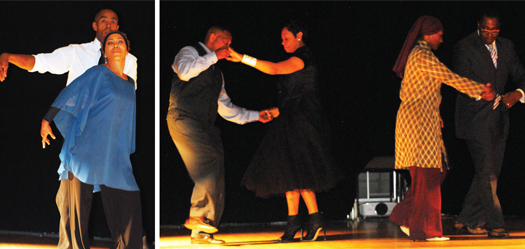
Carl Muhammad and dancer. (R) Chicago steppers on stage.
|
“The U.S. music and entertainment market, which represents a third of the global industry, and is the largest music and entertainment market worldwide, is expected to reach $771 billion by 2019, up from $632 billion in 2015, according to the 2014-2019 Entertainment & Media Outlook by PriceWaterhouseCoopers,” reported www.selectusa.gov.
“The U.S. recorded music industry, including concerts and touring, grew to $15.5 billion in 2016, up from $15 billion in 2015. Thanks to streaming and live music, the U.S. recorded music industry is expected to surpass $18 billion by 2020—$16 billion from streaming services and live music alone. While the U.S. is still the largest global music market and it is essential for a company interested in global operations to establish a presence in the vibrant and highly diverse U.S. music market, competition is strong from European and Asian markets,” the website reported.
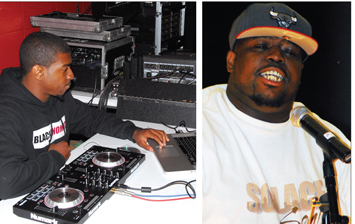
Deejay Manti (R) Jeronimo Photos: Hassan Muhammad
|
“The U.S. filmed entertainment industry encompasses movie theaters, TV subscriptions and electronic home video consumption. Box office receipts are projected to grow from $9.9 billion in 2016 to $10.9 billion in 2020. … Home video will reach $20.9 billion, up from $20 billion in 2016 during the same period, and of that, both streaming video and TV video on-demand will jump from $11 billion to over $15 billion by 2020. The United States has a mature subscription TV market and thanks to rising bundle prices and premium service increases, will grow modestly from $101.8 billion to $102.3 billion by 2020,” predicted www.selectusa.gov.
Professor Ray Winbush of Morgan State University expressed deep concern for the future of younger audiences who are bombarded with negative content. “We can talk about media in terms of Twitter, World Hip-Hop that shows a lot of our people fighting,” he told The Final Call. “Parents need to be very guarded about it. All media the children view should be guarded.”
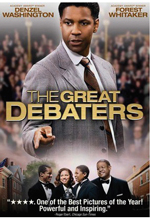 |
Prof. Winbush pointed out the lower ratings educational, positive movies sometimes receive from the Black masses compared to their negative counterparts. “The Great Debaters” in 2007, featuring Denzel Washington made a disappointing $30 million in box office sales, but it was empowering, said Prof. Winbush. The same actor however, played lead in “Training Day,” a 2001 movie about a corrupt Black cop, and it earned over $100 million in sales, said the director of the Institute for Urban Research at Morgan State University. The movie also earned Mr. Washington an Academy Award for Best Actor.
Media links over into Black relationships with one another as a result of White supremacy and the demand for positive imagery has to meet Black interest and investment, the longtime educator and activist added. Prof.
Winbush is a former member of the National Council for Black Studies. He has written many articles and books about Black history, politics and culture. He has appeared on the Oprah Winfrey Show, CNN, BET and CBS discussing racism and African culture. He is currently on the editorial board of the Journal of Black Studies.
“We came to educate our people through rap, that’s why we loved Public Enemy, KRS-One Big Daddy Kane; all of those were teachers. But the enemy, when he saw that we were independent, teaching, he signed us to record labels. Once you get signed to the record label, now you have an A&R man, somebody to tell you what kind of rap you’re going to make; so, it was no longer educating our people through rap, it is now gangsta rap,” said Nation of Islam Minister Louis Farrakhan during a recent radio interview on the Darryl Cooke Show Live.
“I heard that these White folk got together in California with those who were now engaged in the prison industrial complex—and the prisons, now, are on the stock market, because it’s privately-owned and -operated prisons,” he continued.
“A man doesn’t go into making a hotel unless you expect some guests in your hotel. Well, this man is not over prisons thinking that he’s not going to have heavy guests. So what they did, they transformed intelligent rap to gangsta rap, to now ‘drill’—so it goes all the way down into funk and filth and death and destruction. As we beef with each other, then the beef turns into guns.”
But the Minister did more than discuss the problems—for decades he has engaged and encouraged artists to lend their gifts to the Black struggle. And he gave them a platform in Chicago as a fledgling but potentially important sign and collaborative effort rose May 23 at Muhammad University of Chicago on the grounds of the Nation of Islam’s National Center.
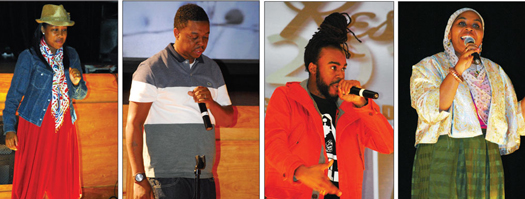
(L-R) September Brooke, Grayco, Limitless Soundz, Phoenix Ali
|

(L-R) Gat Turner, Kenny Muhammad and Young Khan Da Don, Muhammad2G
|

Phenom, Tony Mono, Margaret Mahdi greets Min. Farrakhan Photos: Haroon Rajaee
|
Co-directed by Enoch Muhammad of Hip-Hop Detoxx and Margaret Mahdi of Mahdi Theater Company, the evening production brought together spoken word, rap, dance, singing and acting that featured Muslims and non-Muslims. From now on, Tuesday nights will be a social night showcasing talents and music and art, said Min. Farrakhan who introduced the concept and Enoch Muhammad to the audience in the gym at Muhammad University and a livestream audience. There was even a boxing demonstration during the evening, along with a deejay, live music performers, African drummers, videos and a slide show.
The result was an inspiring and explosive mix of talent and positive messages and energy.
“I thought it was amazing,” said Claire Washington, a college student and journalist. “This was my first time being here at one of the events held at the mosque and it was just amazing to me—it was educational-based, spiritual-based. I think incorporating something that the youth can relate to such as hip hop is a great tool to get everyone to come together.”
Min. Farrakhan expressed his thanks and pleasure at the evening and held a special meeting with the performers and organizers the next day. During the meeting, he talked about the importance of culture and the power of the arts to impact and uplift Black people. Your nature is to obey God and needs to be fed, said the Minister. He thanked Enoch Muhammad, his wife, and all who helped make the night a success. He encouraged the roomful of singers, actors, rappers, poets, musicians, directors, dancers and a boxer-sociology professor to keep their collaboration going and to perfect their crafts and divine gifts. But, Min. Farrakhan added, great gifts must be accompanied by the development of great character, consciousness and humility.
God’s work is the elevation, liberation and the reconciliation of our people, said Min. Farrakhan, noting that all gifts come from God. There must be the proper attitude to overturn a world of evil and wrong and not succumb to it, he added.
“A cultural giant is a warrior on another level,” said Min. Farrakhan. “You can heal a nation with a song, with a movie with a play,” he said. In the early days, Black entertainers dressed up and offered the beauty of their voices or their talents, they didn’t sell sex, the Minister said. But the aim of this world is to sell sex and appeal to the lowest desires of the people, instead of raising them.
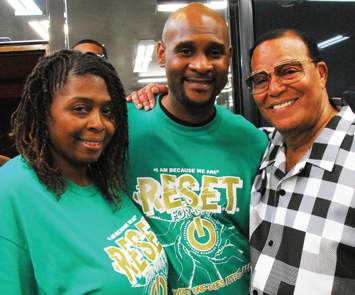
Enoch Muhamad and his wife Keisha with Min Farrakhan
|
“Your master is not shaitan (the devil), he deceived the world. God is pulling you out of the world and making you attractive,” said Min. Farrakhan, in response to a question from a female entertainer. “You don’t have to give up your art, you have to give up the wrong expression of your art,” said Min. Farrakhan.
Hip hop artist Gat Turner from Milwaukee was overwhelmed. “I’m so full from what I have witnessed, it’s like a high,” he said. He was struck by the Minister teaching that Chinese artists bought into the vision of Chinese revolutionary Mao Tse Tung for the rise of their country. As those who have accepted the teachings of the Hon. Elijah Muhamad we have to use our gifts to raise the nation, said Gat, who is also known as Sean Muhammad.
It was important that the collaboration was open to all—even if they were not “technically” members of the Nation of Islam, he said. “Their contributions are valuable,” said the hip host artist.
Young Khan Da Don saw the performances at Muhammad University as the harbinger of a new culture for Black people. The artists as cultural revolutionaries have more power than 100 sermons, as the Minister has said, said the hip hop artist. That places the cultural community at the center for change, he added.
“Art and music combined with the right intentions can be used as a platform to educate and heal instead of degrade and discourage Black people. The pain and suffering that White supremacy is accountable for can be relieved with the right message at the right time,” said Margaret Mahdi, creator of a Chicago-based theater company. “It is a powerful platform that can be used to educate and change lives if you use it properly. There’s a therapy to it as well and as we heal, we are helping others heal.”
Degrading and discouraging images of Black people in the entertainment industry demand that Blacks create their own system, Ms. Mahdi continued. “A film, art and music industry of our own is a responsibility we have to take on because no one else will do it for us,” said the young woman who has produced plays highlighting the music, culture, history and power of the Black community in major venues in Chicago. “It is a responsibility,” she stressed. “It’s mandated—there is no doing it to be seen, doing it for fun. It’s to inspire, transform, uplift and to make a difference.”
Enoch Muhammad saw Tuesday evening as a way to bring change in the community, in organizations and in homes. The diversity of artists and art forms allowed people to express their gifts and art forms. Beat, word, dance, wisdom mathematics allow for creation of a masterpiece, he said.
“We have to be willing to be different, I think that’s the biggest part for people,” said Enoch Muhammad, whose group uses hip hop, music, and art to enlighten and educate youth about the pitfalls of life and negative lifestyles promoted and prominent in mainstream music. “If you don’t fit the format of this world you’re not considered viable because they can’t package and sell you because you (don’t) fit in the sex drugs, murder, violence packaging. And if you don’t fit, they don’t want nothing to do with you.”
But that packaging and product releases poison to listeners and society, he said. “That world is killing you,” observed Enoch Muhammad.
Performers and Staff May 23 at Muhammad University of Islam
Hip hop artists AK-47, Lil’ Prophet, Young Khan Da Don, DA Smart, Phenom; singers Grayco, Akilah Nehanda, Phoenix Ali, Arian Nicole and September Brooke; dancers Carl Muhammad, Donnie Muhammad, Carrey Muhammad and Stick and Move; spoken word Tony Mono, Ques, Gat Turner; actors Earl Muhammad, Arthur Muhammad, Michael Muhammad and Robert Muhammad. Music played by deejay Manti, Vinson Muhammad, Kenny “The Human Orchestra” Muhammad, Muhammad 2G, a platinum producer and Marline Massanoit, spoken word artist.